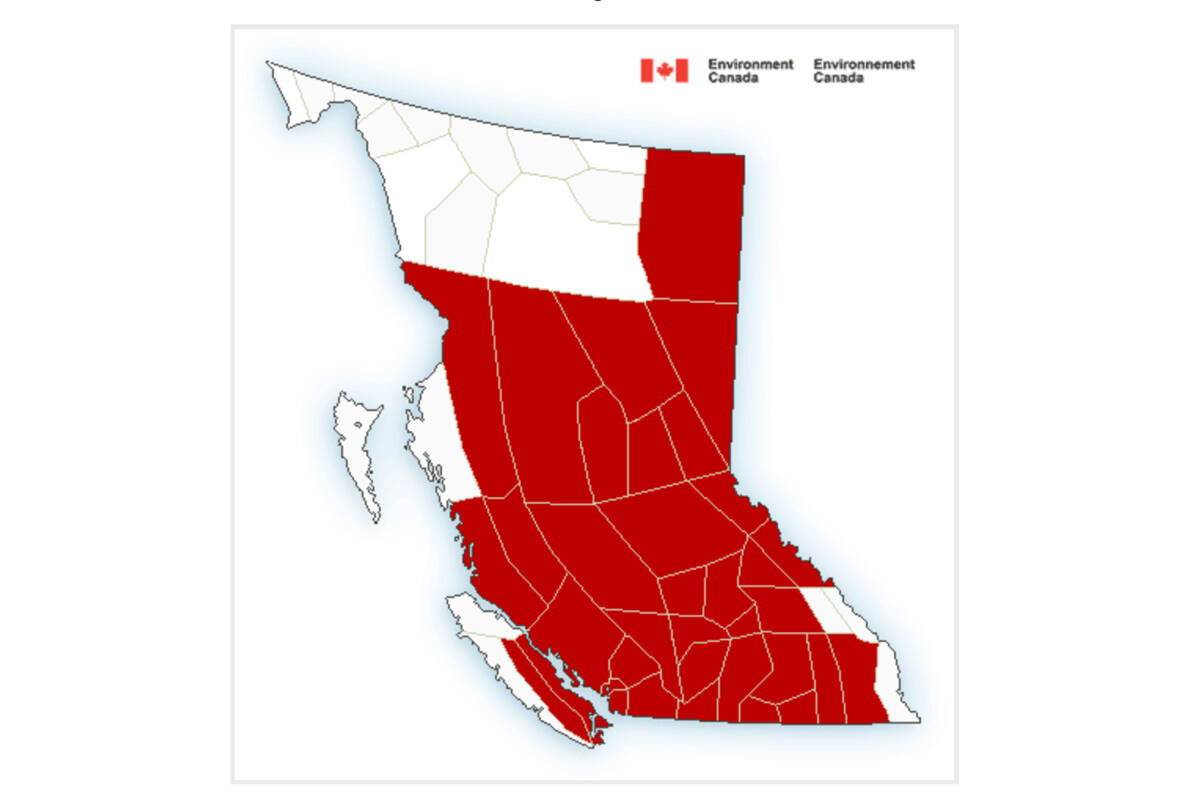The province’s health authority and BC Center for Disease Control released a guide to doing remote and in-person health checks during extreme heat waves.
For people who are susceptible to heat-related illness, ongoing indoor temperatures of 26 C are a risk to health while indoor temperatures around 31 C can be dangerous, according to a news release.
If a person shows signs of severe heat-related illness, it is time to call 911 and use emergency cooling measures, according to the guide. It is also important to stay with a person who has severe heat-illness until emergency services arrive.
Symptoms of severe heat-related illness are:
• Fainting or loss of consciousness
• Confusion or disorientation
• Severe nausea or vomiting
• Difficulty speaking
• Unusual co-ordination problems
• Hot and flushed or very pale skin
• Not sweating
• Rapid breathing and faint but rapid heart-rate
• Internal body temperature of 39 C or higher
• Very low and dark urine output
Emergency cooling measures involve laying a person down in a cooler area (if possible), removing excess clothing, offering water and applying cool, wet towels or ice packs around a person’s body while waiting for emergency services.
Mild heat-related illness symptoms include dizziness, irritability, fatigue, thirst, and an increase in resting heart-rate. A person’s skin may feel warm and sweaty and they may have reduced urine output, according to the guide.
If a person’s internal temperature is 38 C or higher, their heat-related illness has progressed to moderate severity.
If someone has moderate heat-related illness, they may experience a heat rash or swelling, weakness, difficulty swallowing and worsened symptoms of mild heat-related illness.
When someone has mild-to-moderate heat-related illness, encourage them to sit upright and drink water and try to put them in a place with air conditioning or multiple open windows to create a cross-breeze.
The guide also recommends using the same cooling measures used for severe heat-related illness and calling 911 if symptoms do not go away or get worse after trying to cool the person down.
Checking in with a person who may be susceptible twice a day is a good tool to prevent heat-illness, BC CDC scientific director Sarah Henderson said in the statement.
“Many susceptible people may not recognize when they are overheating, but another person can help identify a risky situation with some careful questions and observations.”
According to the guide checklist, people who are at a higher risk for heat-related illness include:
• People aged 60 or older
• People with mental illness or cognitive impairments, such as dementia or mood disorders like depression
• People with chronic disease(s), such as heart disease or diabetes
• People who live alone or are socially isolated
• People who experience substance dependence or use, including drugs and alcohol
• People with decreased mobility, who may find it difficult to take protective measures
• People who take some prescription medications
• People with poor physical fitness
In a June interview with Black Press Media, Henderson advised checking with a pharmacist to learn if your medication can affect heat tolerance.
Remote health-checks are not ideal, but better than no health-check. For remote health-checks, you need the person’s address in case of emergency, contact information for people close to them and information about the person’s risk of heat-related illness.
The full guide, with all checklists and symptoms of heat-related illnesses of different levels, is available online: ncceh.ca/documents/guide/health-checks-during-extreme-heat-events.
The National Collaborating Centre for Environmental Health took the lead developing the guide, alongside University of Ottawa professor Glen Kenny’s environmental physiology research team.

